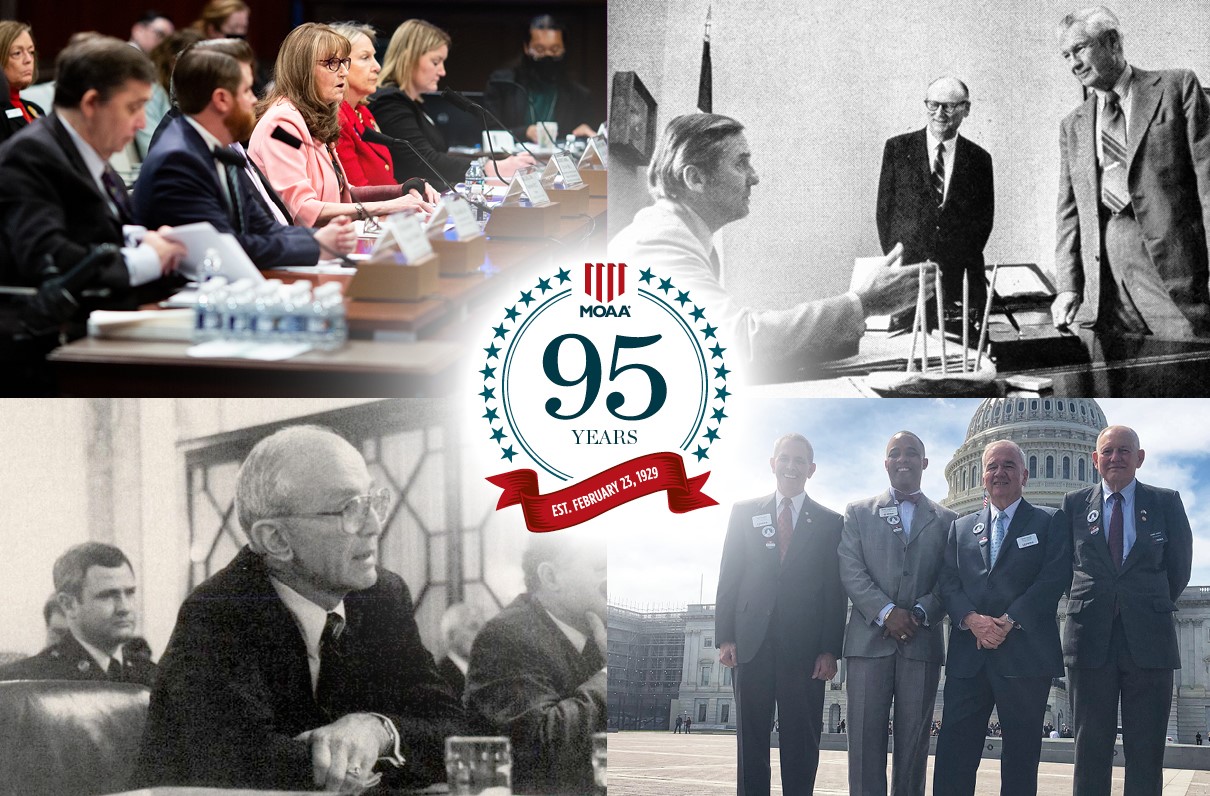MOAA turns 95 years strong on Feb. 23, and while we have adapted and evolved over the years, our core mission has remained intact: advocating on behalf of our servicemembers, veterans, family members, and survivors to preserve and protect their earned benefits and support the “people” side of having a strong national defense.
Formed originally as The Retired Officers Association, founder Col. Arthur T. Marix, USMC (Ret), believed the retiree population could provide vital assistance and knowledge to defense leaders and lawmakers and thereby improve life for our entire military (today’s uniformed services) community.
Our association membership expanded 21 years ago when we became the Military Officers Association of America, and we stand tall today with 363,000 members from among the currently serving and previously served/retired communities. MOAA has been on the leading edge every year since our inception in continuously preserving earned benefits, but as we take a moment to celebrate MOAA’s birthday, I want to share some of the major advocacy milestones MOAA’s been a key part of over the years:
- In the 1940s, our advocacy mission was not achieved through meetings with Congress. Rather, we influenced laws by providing input and guidance through the Navy chief of the Bureau of Personnel and the Army deputy chief of staff for personnel. The association hired its first lobbyist in 1944, and by the 1950s, the association was working directly with Congress.
- In the 1950s, MOAA worked with other organizations to ensure military members were eligible for full Social Security benefits.
- In the 1960s, MOAA helped lead the charge in creating what is today the Survivor Benefit Plan (SBP).
- In 1972, MOAA organized the Council of Military Organizations, a group of legislative representatives of 12 uniformed service-type organizations, both officer and enlisted, meeting monthly to discuss legislative affairs.
- A unified voice was needed again in 1985, and MOAA joined with 15 other military associations to form The Military Coalition and undo the complete elimination of the cost-of-living allowance (COLA) included in the Balanced Budget and Emergency Deficit Control Act of 1985. On Oct. 21, 1986, President Ronald Reagan signed the Omnibus Budget Reconciliation Act, which exempted military and federal civilian retirees from these cuts and linked their COLA payments to those of Social Security recipients.
- MOAA took the lead in organizing a program to make the nation aware of the financial hazards of the Medicare Catastrophic Coverage Act of 1988. A national coalition was founded called the Coalition for Affordable Health Care. When the impact of the act spread to the grassroots, it was repealed.
- In the early 1990s, MOAA launched a series of friend of the court (amicus curiae) legal briefs to the U.S. Supreme Court to assist retiree groups in recovering state taxes illegally imposed on military (and, in some cases, federal civilian) retirees. Collectively, these briefs were instrumental in having the various states refund almost $900 million to retirees for a cost to MOAA of about $100,000.
- MOAA worked with others in the coalition to win repeal of the REDUX retirement system.
- MOAA and other military advocates fought throughout the 1990s for legislation to improve the military health care benefit for Medicare-eligible retirees. With the FY 2001 National Defense Authorization Act (NDAA), Congress established TRICARE For Life to cover out-of-pocket costs after Medicare reimbursement and expanded the TRICARE retail and mail-order pharmacy programs to Medicare-eligible retirees.
- Lawmakers approved the FY 2020 NDAA and its provision to eliminate the Survivor Benefit Plan-Dependency and Indemnity Compensation offset, better known as the “widows tax,” which MOAA and supporters fought to eliminate for decades. This unfair policy cost up to $12,000 per year for nearly 67,000 spouses.
- The MOAA-backed Sergeant First Class Heath Robinson Honoring our Promise to Address Comprehensive Toxics (PACT) Act of 2022, which became law Aug. 10, 2023, supports millions of servicemembers and veterans exposed to harmful toxins.
As a member of our community, you’re already playing an important role in getting laws like these passed. As our founder knew, there is strength in numbers.
It’s truly a privilege to serve and continue our founders’ legacy. Happy birthday, MOAA!
When MOAA Speaks, Congress Listens
Learn more about MOAA’s key advocacy issues, and contact your elected officials using our messaging platform.

